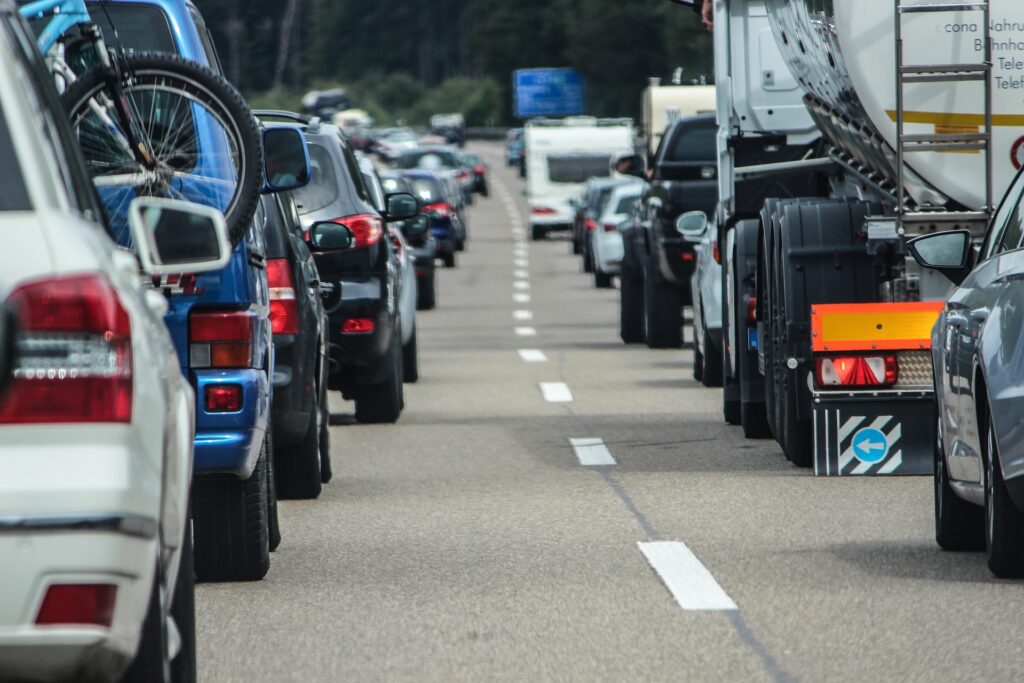SCOTLAND is in the grip of an “air pollution crisis” triggered by over reliance on cars, hard hitting new stats reveal.
Green campaigners have seized on the figures as proof more needs to be done to tackle the problems urgently.
Campaigners Friends of the Earth Scotland said the health of the elderly and children were being risked by poor policy decisions.
While the Scottish Green Party said it held the Scottish Government to account and demanded they “get real” over transport.
Figures published today by Transport Scotland show clearly that Scotland’s road are still dominated by cars.
More than half of all journeys are under 5km, and the average around 6.6km.
It also revealed the majority of trips to work – 67 percent – were made by car.
Only three percent were done by bike and 10 percent by bus
Tellingly, single occupancy journeys accounted for 67 percent of car journeys in last year.
That was up from 62 percent in 2007.
More miles than ever – 45.4 billion vehicle kilometres – were driven on Scotland’s roads in 2015, the most recent available data showed.
That is equivalent to 60,000 return trips to the Moon, say FoE Scotland.
But while more car miles are clocked up, bus passenger numbers fell 17.4 percent from 476 to 393 million journeys since 2006.
That coincides with fares rising by 19 percent between 2010 and 2015.
And although there has been a push for electric vehicle use, people are still unsure about using them.
The distance travelled on a single charge and the availability or convenience of charging points were cited as key deterrents ton people buying them.
Emilia Hanna, Air Pollution Campaigner for Friends of the Earth Scotland said that much more had to be done to tackle the problems – including making it easier for people to use electric vehicles and public transport.
She said: “Transport is the largest sector in terms of Scotland’s climate emissions and with the dominance of fossil fuelled cars in these figures it is not difficult to see why.
“The legacy from decades of decisions to prioritise cars above all modes is congested streets that are damaging to both our lungs and the climate.”
“The statistics reveal Scotland’s transport system continues to favour the private car, to the neglect of cleaner, fairer modes of transport like buses, walking, and cycling.
“The result is that we have an air pollution health crisis, with all of our major city centres tarnished by toxic air, and with vulnerable people including children, the elderly and the ill disproportionately affected.”
She welcomed the Scottish Government’s aim to phase out fossil fuel cars, but said that had to be done in tandem with new technologies, and for a central plank of policies.
She said: “This research reveals that a key barrier to the uptake of electric vehicles is that people are worried their electric car might run out of power mid-journey.
“By investing in charging points across Scotland, starting with the A9, the Scottish Government will help remove this ‘range anxiety’.
“The Scottish Government should embed its commitment to phasing out diesel and petrol vehicles by 2032 in the upcoming Climate Bill.
Friends of the Earth Scotland also sounded the bell on a possible re-regulation of bus services as part of its action on climate change.
Emily Hanna added: “Buses have the potential to be a solution to air pollution because one full double decker can take 50 cars off the road.
“These statistics confirm that our bus sector is in crisis, with passenger numbers falling significantly in the last decade. The Scottish Government should re-regulate the bus sector through its Transport Act so that councils can better ensure that bus services operate in the public interest.
She added: “Low Emission Zones, which should initially require cleaner buses, vans, and lorries in our cities, should make buses a more attractive experience for passengers.
“Bus operators should make use of the Government’s Green Bus Fund to help clean up their vehicles.
“Lothian Buses in Edinburgh boasts Scotland’s cleanest fleet and continues to see rising passenger numbers and is testament to the fact that the rest of Scotland’s bus operators can and should do much better.”
The Scottish Government has already doubled the amount of cash it plans to invest in cycling and walking which currently makes up a small percentage of all work journeys.
She said plans for Low Emission Zones with cleaner air may help boost those numbers.
The Scottish Greens’ transport spokesperson John Finnie said the government needs to “get real” on its transport policy and begin a shift away from investing in the most polluting forms of transport.
Highlands and Islands MSP, John Finnie said “The Scottish Government is getting it badly wrong when it comes to its transport policy.
“It’s clear from these figures that government policy continues to encourage the most polluting forms of transport and, as made clear in an expert report, puts carbon cutting targets ‘at risk’.
“Ministers should hold off on boasting about the very small increase in cycling use because this will do little to offset the pollution generated from rising car and air travel.
“With the fall in bus passenger numbers, ministers are also failing to realise how important buses are for people on low incomes and in rural communities.
“The government needs to get real on its transport policy and rather than listening to aviation industry lobbyists on cutting taxes, ministers need to listen to the public, cancel their proposed air departure tax cut and step up investment in the buses, trains and bike lanes we all need.”
Want to learn more? Read: Transport Scotland – Transport and Travel in Scotland 2016
Image credits: Cars cc RettungsgasseJETSZTde

